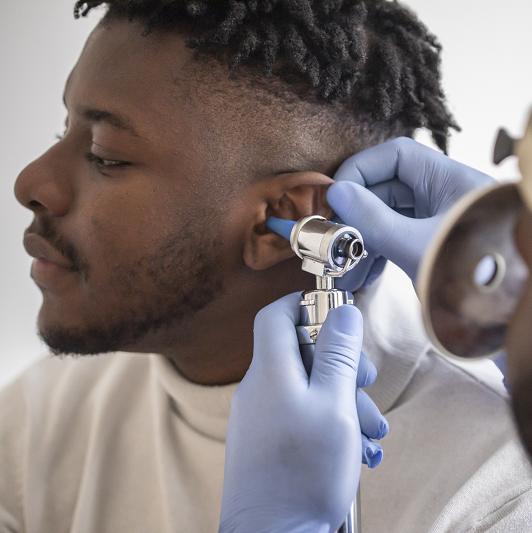Why Do My Ears Feel Clogged? 4 Common Causes & Treatments

May 10, 2021
When your ears feel clogged, it can be uncomfortable and annoying — especially if it results in muffled hearing. However, getting relief depends on identifying what is causing that clogged sensation.
Virginia Gural-Toth, AuD, CCC-A, manager of Audiology, Tinnitus and Balance Programs at the Center for Audiology at JFK Johnson Rehabilitation Institute, says that there are several common causes of clogged ears, including:
Impacted Ear Wax
If your ears are full of wax, they can often feel clogged. And sometimes, ear wax buildup can be tough to remove.
“If you think you have excessive ear wax, you can try over-the-counter drops,” explains Dr. Gural-Toth. “However, if it doesn’t come out in a day or two, seek medical attention so a health care provider can remove it safely.”
Dr. Gural-Toth says that you should never attempt to remove ear wax using a Q-tip. “Using a Q-tip could push the wax further in,” comments Dr. Gural-Toth.
Eustachian Tube Dysfunction
Eustachian tube dysfunction occurs when the Eustachian tube — which connects the middle ear to the back of the throat — doesn’t open and close properly. When the Eustachian tube doesn’t open and close properly, it can cause that clogged-up feeling.
“The Eustachian tube helps to drain fluid from the middle ear and equalize the pressure between the middle ear and the atmosphere outside,” says Dr. Gural-Toth. “If it is blocked due to swelling or fluid, it can make your ears feel clogged.”
Dr. Gural-Toth says that problems with pressure equalization are why people often experience clogged ears when riding in an airplane.
“That’s why people swallow, chew gum and pinch their nose and gently blow — to get their Eustachian tube to open,” says Dr. Gural-Toth.
Sinus or ear infections, allergies and other respiratory viruses — all of which can cause swelling and fluid in the ear — are common causes of Eustachian tube dysfunction.
“If you suspect your clogged ears are caused by a respiratory illness, over-the-counter medications recommended by your doctor may help to decrease the accumulation of fluid or swelling,” adds Dr. Gural-Toth.
Hearing Loss
According to Dr. Gural-Toth, hearing loss can sometimes be perceived as a clogged feeling.
“If your ears feel clogged without an obvious cause, you should see your primary care provider and ask for a referral for a hearing test from a qualified audiologist,” says Dr. Gural-Toth. “Sometimes, this can be due to age- or noise-related hearing loss, but it could also be due to another disorder — such as a growth on the auditory nerve called an acoustic neuroma, or an inner ear disorder called Ménière’s disease.”
COVID-19
Although there aren’t many studies on COVID-19 and hearing loss, any upper respiratory infection — including COVID-19 — can lead to a clogged-up feeling in the ears due to swelling and fluid buildup.
“Get a COVID-19 test to rule out the possibility of having the virus,” shares Dr. Gural-Toth.
Treatments for Clogged Ears
Dr. Gural-Toth says that resolving clogged ears depends on identifying the cause and getting proper treatment.
“If your clogged ears persist despite home treatment, you should talk to your primary care provider about your symptoms,” says Dr. Gural-Toth. “Your primary care provider can determine what next steps you should take and refer you to an audiologist for a hearing test, if necessary.”
Next Steps & Resources
- Our source: Virginia Gural-Toth, AuD, CCC-A, manager of Audiology, Tinnitus and Balance Programs at the Center for Audiology at JFK Johnson Rehabilitation Institute
- Make an appointment online or find a primary care provider near you, or call 800-822-8905.
The material provided through Healthier You is intended to be used as general information only and should not replace the advice of your physician. Always consult your physician for individual care.






